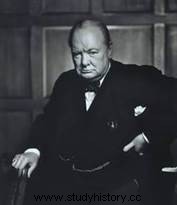 Winston Churchill (1874-1965) was a British statesman who served as Prime Minister of the United Kingdom from 1940 to 1945 in the midst of World War II (and again from 1951 to 1955). An atypical figure in British political life, Churchill enjoyed a career of exceptional longevity. From the early 1930s, he saw the rise of Nazism in Germany as a threat to Europe. Prime Minister between 1940 and 1945, he was one of the main architects of the resistance of the United Kingdom and the victory of the Allies against the Axis. After the war, Winston Churchill coined the term “Iron Curtain” in 1946, marking the start of the Cold War period.
Winston Churchill (1874-1965) was a British statesman who served as Prime Minister of the United Kingdom from 1940 to 1945 in the midst of World War II (and again from 1951 to 1955). An atypical figure in British political life, Churchill enjoyed a career of exceptional longevity. From the early 1930s, he saw the rise of Nazism in Germany as a threat to Europe. Prime Minister between 1940 and 1945, he was one of the main architects of the resistance of the United Kingdom and the victory of the Allies against the Axis. After the war, Winston Churchill coined the term “Iron Curtain” in 1946, marking the start of the Cold War period.
The very aristocratic origins of Winston Churchill
Winston Churchill's baby face barely conceals a strong character. Born November 30, 1874, this descendant of the Dukes of Marlborough, who served as a cavalry officer in India and the Sudan, made himself known in England by escaping from a South African prison during the Boer War (1899 - 1902) which he covered as a war correspondent in South Africa.
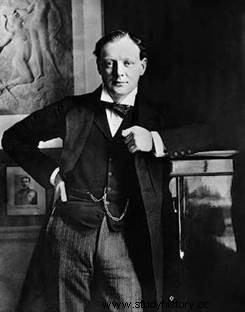 Elected Conservative MP in 1900, he entered the House of Commons, where he sat for almost sixty years, almost non-stop! In fact, the rigor of his analyses, his stainless frankness, his hard-hitting eloquence and his keen sense of repartee will have a decisive influence on the style and content of the debates in the Commons.
Elected Conservative MP in 1900, he entered the House of Commons, where he sat for almost sixty years, almost non-stop! In fact, the rigor of his analyses, his stainless frankness, his hard-hitting eloquence and his keen sense of repartee will have a decisive influence on the style and content of the debates in the Commons.
Churchill, An iconoclast in politics
During his long political career, Churchill held many ministerial posts (trade, interior...). Appointed First Lord of the Admiralty (1911-1915), he repressed the great strike of the dockers then that of the railway workers and considerably modernized the British fleet. The failure of the Dardanelles expedition, which he had promoted, forced him to resign from the Admiralty. After having commanded a battalion on the front in France, he joined Lloyd George's coalition cabinet, where he occupied, from 1917 to 1922, the functions of Minister of Munitions and Secretary of War. The collapse of the Liberal Party and Lloyd George's government kept Churchill out of Parliament from 1922 to 1924.
Re-elected in 1924, this time as a Conservative MP, he became Chancellor of the Exchequer in the Conservative government of Stanley Baldwin (1924-1929). He undertakes to attach the pound sterling to the gold standard, which has disastrous consequences on the British economy and contributes to triggering the social crisis of 1926, where he vigorously fights the unions. He was removed from power by the defeat of the Conservatives in 1929, and during the 1930s devoted himself mainly to writing. He marked, during this period, his opposition to the autonomy of the Indies, and his support for Edward VIII during the abdication crisis of 1936.
An unclassifiable character, he explodes traditional political divisions, alternating between the conservative party and the liberal party. His political work had brilliant successes (social legislation, reorganization of the British fleet) but also bitter failures (Dardanelles expedition, support for the anti-Bolshevik struggle). It was the war that revealed Churchill's historical stature. He had already given a glimpse of his talents as a war leader during the First World War, by organizing the British war effort. But it was the Second World War that would definitively establish his reputation....
At the helm in the storm of World War II
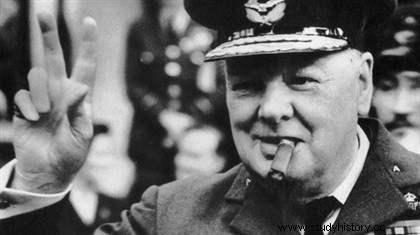 We are struck, throughout Churchill's career, by the foresight of his analyzes of the international situation :he is among the first to foresee the Nazi danger and to condemn the policy of “appeasement” led by Western democracies. A policy that could not prevent the outbreak of war in September 1939, in which Churchill intends to invest.
We are struck, throughout Churchill's career, by the foresight of his analyzes of the international situation :he is among the first to foresee the Nazi danger and to condemn the policy of “appeasement” led by Western democracies. A policy that could not prevent the outbreak of war in September 1939, in which Churchill intends to invest.
First Minister of War, he became Prime Minister in May 1940, when the French ally had just collapsed, leaving the United Kingdom alone against axis forces. During his investiture, he galvanized the resistance of his country:"My policy is to make war, on sea, on land and in the air, to make it against a monstrous tyranny, such as the dark and lamentable catalog of crimes humans offer nothing worse… I have nothing to offer but blood, toil, sweat and tears”. During the dark days of the Battle of Britain, Churchill's pugnacity and impassioned speeches persuaded the British to continue the fight.
After the French rout of June 1940, he had no choice but to attack the French fleet at Mers-el-Kébir, Algeria (July 3, 1940) to prevent it from falling into German hands. One more demonstration of his fierce determination to fight, whatever the cost. With the help of Antony Eden, he developed a fruitful collaboration with President Franklin D. Roosevelt, obtaining the military and moral support of the United States. After the entry into the war of the Soviet Union, with which, although fiercely anti-communist, he agreed to ally himself, and of the United States, in 1941, Churchill forged close ties with the leaders of what he called the “Grand Alliance”, including with General de Gaulle, the leader of Free France.
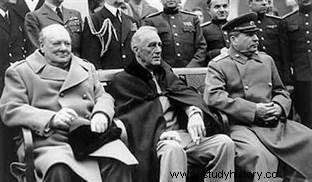 Moving on all fronts throughout the war, he played a major role in the coordination of Allied military strategy. He had a leading role in major peace conferences, notably in Yalta (1945). He only participated in the first Potsdam negotiations, because he lost the elections of July 1945; Labor Clement Attlee replaces him as head of government.
Moving on all fronts throughout the war, he played a major role in the coordination of Allied military strategy. He had a leading role in major peace conferences, notably in Yalta (1945). He only participated in the first Potsdam negotiations, because he lost the elections of July 1945; Labor Clement Attlee replaces him as head of government.
Winston Churchill, visionary to the end
During the war, he had accepted the Soviet alliance while warning against the expansionist tendencies of communism in Eastern Europe. An intuition confirmed at the end of the war with the gradual ousting of all democratically elected governments in Eastern Europe by communist regimes under orders from Moscow. As early as 1946, during his famous Fulton speech, he launched the expression "iron curtain" which fell in Europe. To face the USSR, he proposed in September 1946 in Zurich, “something like the United States of Europe. To carry out this urgent task, France and Germany will have to reconcile. »
In the history of the first half of the 20th century, Churchill is a free electron whose surprising trajectory persists in crossing all the political turning points of his time. And when Sir Winston Churchill finally retired from political life in 1955, it was with the reputation of a great statesman, revered by the population and respected by all parties, as well as by Queen Elizabeth II. This atypical destiny will even be crowned by the Nobel Prize for Literature in 1953. He devoted his last years to painting and writing, helplessly assisting in the dismantling of the British Empire of which he was an ardent defender.
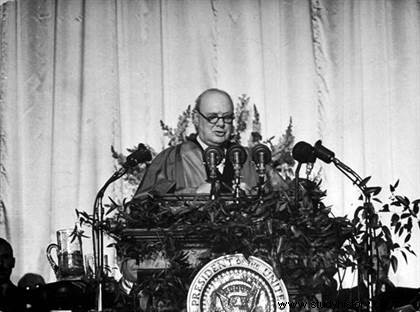 After his death on January 24, 1965, a grand and moving national funeral was organized to pay a last tribute to the one of the last giants of the 20th century. With Churchill, the United Kingdom also buries a world, that of the Victorian era and the world domination of the British Empire.
After his death on January 24, 1965, a grand and moving national funeral was organized to pay a last tribute to the one of the last giants of the 20th century. With Churchill, the United Kingdom also buries a world, that of the Victorian era and the world domination of the British Empire.
Bibliography
- Winston Churchill, biography of François Kersaudy. Tallandier, 2015.
- Winston Churchill:A Life, by John Keegan. The Beautiful Letters, 2018.
